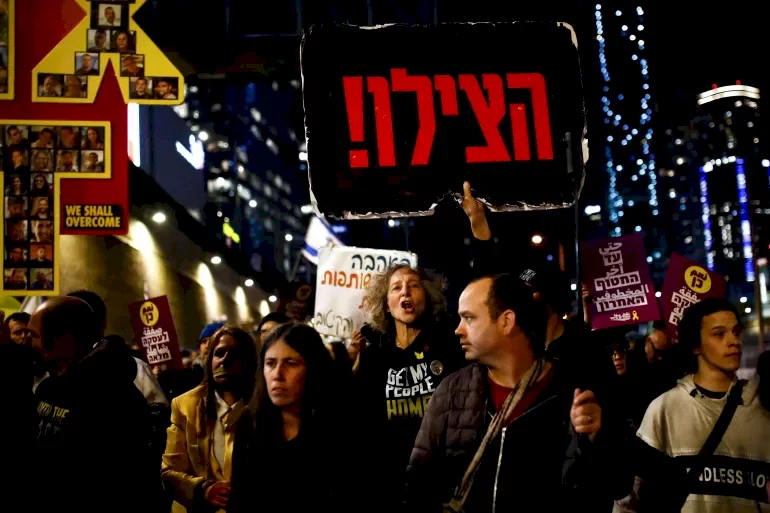
Hebrew Newspaper: Families of Prisoners Protest Shakes the Israeli Market
SadaNews - The newspaper "The Marker" revealed that the large sit-in organized last Sunday, called for by the families of Israeli prisoners in Gaza and widely attended by civil and labor organizations, did not only have an impact on the political and social sides, but also extended to leave a direct economic effect on the local market.
The sit-in included the disruption of central facilities, including major shopping centers, restaurants, cafes, and several food and clothing retail networks, as the organizers called on the public to refrain from purchasing and using credit cards, in a symbolic move to send a pressure message to the government.
General Decline of More Than 7%
According to data from "Shva", total spending via credit cards on the day of the sit-in was 2.081 billion shekels (approximately 562 million dollars), a decrease of 7.5% compared to the previous Sunday.
Although the overall decline appears to be limited, sectoral analysis shows that the blow was harder in some sensitive areas, which "The Marker" described as "an unprecedented impact of a protest movement on daily consumption patterns."
Significant Decline in Various Sectors
The restaurant, café, and ready-made food sector recorded a sales drop of 13.6%, declining from 123.5 million shekels (about 33.4 million dollars) to 106.8 million shekels (about 28.9 million dollars). The clothing and footwear sector, which is highly sensitive to any changes in consumer mood, saw an even larger decline of 16.6%, dropping from 116.6 million shekels (approximately 31.6 million dollars) to 97.7 million shekels (around 26.5 million dollars only).
The most severe drop was recorded in the luxury food sector, such as bakeries, butcher shops, and fish stores, where sales plummeted by 21.9%, from 54 million shekels (approximately 14.6 million dollars) to 42.2 million shekels (around 11.5 million dollars only).
According to "The Marker", this category - which usually represents essential daily spending - showed that the protests did not only affect luxury items, but also included basic goods.
Other Sectors Under Pressure
The newspaper reported that the cosmetics and pharmacy sector recorded a decline of 14.9%, with spending falling from 60.5 million shekels (approximately 16.4 million dollars) to 51.4 million shekels (around 13.9 million dollars).
Meanwhile, spending on electrical appliances and electronics declined by 11.1%, from 157.6 million shekels (about 42.7 million dollars) to 140.1 million shekels (approximately 38 million dollars).
These figures, according to the report, reflect "a general consumption contraction affecting various aspects of the market, with a simultaneous decline in both luxuries and necessities alike."
Dual Political and Economic Impact
"The Marker" emphasized that what occurred does not represent just a fleeting incident related to a single day, but may indicate the extent of the Israeli economy's sensitivity to protest movements.
The newspaper affirmed that "a decline of this magnitude across all major sectors indicates that the protests were not merely symbolic, but left a direct negative economic footprint."
In light of this decline, analysts warned that the continuation of popular movements could expand the economic impact, through diminishing consumer confidence and weakening revenues of commercial sectors, at a time when the Israeli economy is already facing rising challenges linked to global slowdowns and political uncertainty.
Source: Hebrew Media

The Problem of Shekel Overcrowding Worsens.. Fuel Station Owners Threatened with Closure o...

The Palestinian Economy at a Crossroads: 4 Files Awaiting Resolution

Arab Ministers of Economy and Trade Adopt Decisions and Recommendations in Support of Pale...

Hebrew Newspaper: The International Monetary Fund Provides a Contradictory Report on the I...

The Dollar Falls and the Shekel Gains... Will the Palestinian Employee Bear the Cost?

First week of February records about 1.5 million dollars in trading, and the Jerusalem ind...

Governor of the Monetary Authority: Economic Challenges in Palestine Require Innovative Fi...
